LONDON, UK – Wall Street rose on Thursday but European stock markets fell as investors brace for US jobs data that they fear could prompt the Federal Reserve to ramp up interest rate hikes.
Markets were rocked this week by Fed chief Jerome Powell’s warning that interest rates could rise should the economy show no sign of slowing as the central bank scrambles to tame stubborn inflation.
Investors fear a strong reading in Friday’s US jobs report for February could prompt the Fed to boost rates higher than expected at its meeting this month, a move that could spark a recession.
European stock markets were down in afternoon trading but Wall Street opened higher after Asia closed mostly lower.
“It would appear investors are taking a cautious stance ahead of tomorrow’s jobs report, a little spooked by Powell’s comments in Congress and fearful of being caught on the wrong side of another hot jobs report,” said Craig Erlam, analyst at trading platform OANDA.
“That’s clearly the danger at this point, that we get another hot report that confirms January was no blip and instead indicative of a labor market that not only isn’t cooling but perhaps getting hotter,” he said.
The Fed raised rates by a quarter basis point in December, lower than previous decisions, but some traders are betting on a return to a 50-point hike this month.
Investors are also waiting for the latest US inflation figures due next week.
“If these macro pointers both come in hotter, or at least match expectations, then that could further raise bets over a 50-basis point rate increase at the Fed’s March 22 meeting,” said Fawad Razaqzada, market analyst at City Index and FOREX.com.
Friday sees also a key meeting of the Bank of Japan.
The “BoJ will meet for the last time under Governor Haruhiko Kuroda amid increasing speculation of a ‘legacy’ change to policy”, said Stephen Innes of SPI Asset Management.
The central bank’s longest-serving leader, Kuroda became governor in 2013 and his attempts to boost Japan’s moribund economy have ranged from a negative interest rate to spending vast sums on government bonds.
In the past year, he has held firm, even as other central banks hiked rates to tackle inflation, with the resulting policy gap causing the yen to slump against the dollar.
The yen on Thursday rebounded against the US unit, which was down also versus the euro and pound.
Concerns about rising rates put pressure on oil prices but they crept higher on Thursday.
European wholesale natural gas prices dived to the lowest level since August 2021, as high storage levels eclipsed the impact of colder weather.
The benchmark European contract – Dutch TTF gas futures for the coming month – dropped to 40.50 euros per megawatt hour following heavy falls in recent months.
It later clawed back some ground to trade above 41 euros.








